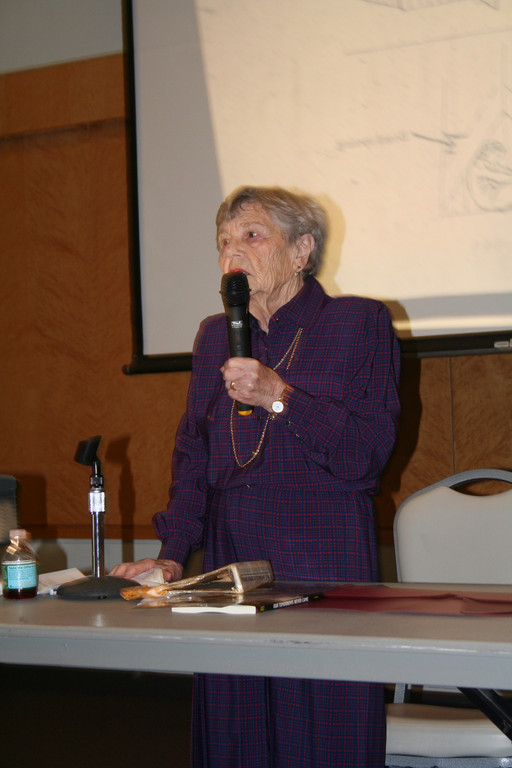Recounting her Holocaust horror story
Ethel Bauer Katz relays tale to younger generation
When Ethel Bauer Katz, a Holocaust survivor and author of “Our Tomorrows Never Came,” told audience members at Nassau Community College that she was the only one to survive out of her family of seven, the room fell silent.
Sally Ann Drucker, a member of the Department of English at the college, invited Katz to speak on Sept. 21 because she felt it was vital for her students to hear Katz’s story of survival during the Holocaust. “It’s like the saying, ‘if we don’t know history, than we’re doomed to repeat it,’’ she said. “It’s important for people to see what can happen if we don’t vote, don’t protest when people’s civil liberties are abridged and when we take Democracy for granted.”
Katz began her story on July 5, 1941, and said when she was just 17-years old; the Germans marched into her hometown of Buchach, Poland. Her mother died before the war broke out. “The first three days 100 Jews were killed and everything Jewish was destroyed including synagogues and Hebrew schools,” she said. “The Germans took over and demanded that the Jewish community form a committee that would take orders from the Nazis. We had to wear an armband with the Jewish star on it, we couldn’t walk on sidewalks, go to public places, parks and we had a curfew.”
Six weeks later, an order came in for men, ages 18 to 50, to report to the police station before 6 p.m. or they would be shot. Her twin brother ran home, grabbed something to eat, and told his family he would see them later that evening, but nor Ethel or her family ever saw him again. She was told the Germans jailed the professionals; lawyers, doctors and teachers for the night and at 3 a.m., they were brought to the forest where 450 of them were murdered. “They figured the professionals would be the potential leaders of resistance so they got rid of them first,” she said. “The Germans were very smart.”
In the fall of 1943, Katz, her twin younger brothers, sister and father had to seek refuge anywhere they could to hide from German soldiers. They fled from place to place until they ended up back at their farm where every building but their house had been torn down. “We hoped we would survive,” she said.
On March 8, German soldiers surrounded their home and Katz and her twin brothers escaped through a window. “We started running but the snow was so deep so we were only able to run a few yards,” she said. “Then I felt a knock on the back of my head and fell unconscious in the snow. When I woke up, I saw black boots standing over me so I closed my eyes, played dead and prayed to God for a miracle. When I looked again, the black boots had disappeared.”
The soldiers had caught up with her twin brothers and returned to the house fetch her father and sister. “They took them into a field where they were murdered,” she said. “Two weeks later, the Russians liberated the area … two weeks too late.”
Lydia Orabona of Westbury thought it was amazing how Katz went through something so horrible and was able to share her story. “While we lost a lot of people on September 11, it’s different from the Holocaust because there are no survivors who can speak and tell you what they went through,” she said. “People need to understand that everyone has different values and beliefs and they don’t have to be yours.”
Although the Russians liberated the area, it was short-lived, as Germans soon re-occupied the area and Katz was forced into hiding for four months in a former home her family owned. She hid in a fake wall that opened to reveal a secret hiding place, for which if it never existed, she may not have survived. “It was God sent,” she said. “I came to the U.S. on January 24, 1947 and every morning I say, ‘God Bless America for the freedom we have here.’”
Drucker said this is the last generation to hear Holocaust survivor’s stories. “My students will know the facts and horrors of what happened,” she said, “and they will be the ones carrying on the message from now on.”






